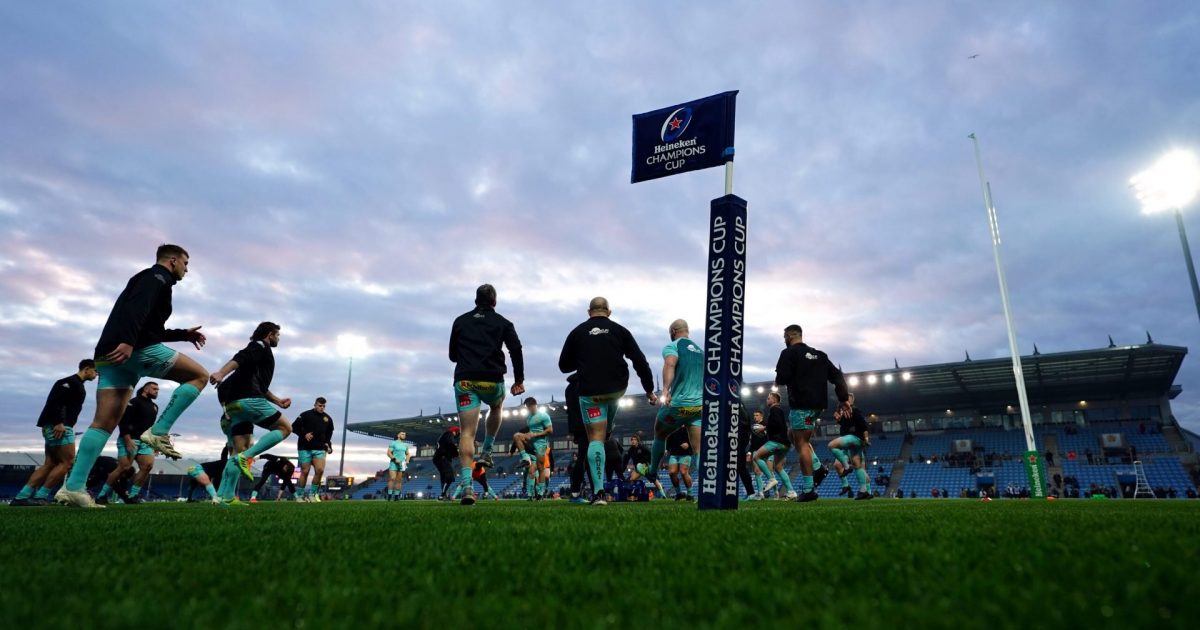Exeter Chiefs For Change, the group that has campaigned against the club’s use of Native American iconography in their logos, say they are ‘overwhelmed’ with the new kit design.
Exeter are set to rebrand themselves this year in line with the ‘Celtic Iron Age Dumnonii Tribe’ after deciding to abandon the controversial Native American theme that has provoked fierce criticism.
The new identity, including a change to their logo, will take effect from July and while the ‘Chiefs’ nickname is being retained, the club said it will be now be aligned with a “poignant and significant nod to the past”.
The Celtic Iron Age Dumnonii Tribe encompassed an area covering Devon, Cornwall and parts of Somerset for centuries before the Roman occupation from 43AD.
The rebrand is set to cost Exter in the region of £500,000.
Not everyone is happy with the rebranding, with Exeter CEO Tony Rowe suggesting more of their fans wanted to keep the current branding than not.
Chiefs fans have repeatedly been asked by opposition clubs not to wear the symbolic headdress to their grounds, while the National Congress of American Indians wrote to chairman Tony Rowe last year to say that the current branding “harms native people through the offensive stereotypes it promotes”.
“We are excited to welcome in the next era of rugby within Exeter. Exeter has and always will be the most important term in our overall identity,” Rowe said.
“The term Chiefs, however, is equally entrenched in our make-up, going back to over a century ago when teams in this region would regularly call their first teams that of the Chiefs. We are Exeter, we are the Chiefs!
“As a rugby club we have been willing to listen, we have consulted far and wide, and now we are ready to invoke change.
“This is a new direction for our great club, but equally it’s an exciting vision that I’ve no doubt will propel us onwards and upwards over time.
“Our new imagery will bring to life the pride our supporters have to support their club, unifying us all under one brand that underlines all of our core traditions.”
Exeter, the 2020 Gallagher Premiership and Heineken Champions Cup double winners, first officially became known as the Chiefs in 1999 but have had links with the nickname for decades.
Their mascot ‘Big Chief’ was retired last year as opposition to the branding intensified.
In addition to their new association with the Celtic Iron Age Dumnonii Tribe, Exeter are also drawing from the history of the ‘Celtic Kingdom of Dumnonia’, which was established around AD 410 and lasted almost five centuries.
“The change in identity comes in the wake of the Exeter board undertaking a full and informative review process over the past two years,” a club statement read.
“In launching the new imagery, detailed submissions, together with extensive historical research from leading professionals, have been undertaken to ensure the club have a brand that not only recognises our traditions but, more importantly, identifies with our supporters and the region itself.”
Rowe has revealed that the cost to Exeter of making the change is in excess of £500,000 at a time when Premiership clubs are facing financial hardship because of the coronavirus pandemic.
“I’m guessing at the moment because we still haven’t had all the stuff back, but it’s going to be close to half a million pounds at least to do a brand change,” Rowe said.
“We’ve had to struggle in the last couple of years with Covid, to get the money to keep us alive and to keep us here.
“So it’s going to be a big challenge, but we like big challenges at Exeter Rugby so we will do it.
“Two years ago there was a petition with about 7,000 people saying you should change your logo. We also had a petition that raised nearly 10,000 saying don’t change.
“It’s where you sit, but the board decided the time was right to change.”
The Exeter Chiefs for Change Twitter account said that the Chiefs “can now put the controversy behind them”, posting: “Our faith in the club has been restored today and we are overwhelmed with excitement at the new identity for the club – one that celebrates Devon’s own rich history and gives us even more reason to be proud of our club and our region.
“Exeter Chiefs can now put the controversy behind them as we focus on moving onwards and upwards to the next great era in the club’s history. The club has always been so much more than its branding: there was a long history before the Native branding and there will be a long future after it.
"We are overwhelmed with excitement at the new identity for the club" ??
Please see our statement regarding @ExeterChiefs decision to rebrand below ?#ChangedTheChief pic.twitter.com/7UJqq7TTl8— Exeter Chiefs For Change (@ExChiefs4Change) January 27, 2022
“It’s entirely right that. as we learn more about the impact of the things we are doing, we have the strength of character to take that on board and change. Indigenous peoples have long said they are not respected nor honoured by the Native imagery and scientific studies have shown it contributes to some of the ongoing challenges Indigenous peoples face, so we’re relieved that those concerns have been listened to and acted upon.
“We’re really excited to be getting back to just enjoying the rugby – even if that is a cold afternoon at London Irish at the weekend!”
































































